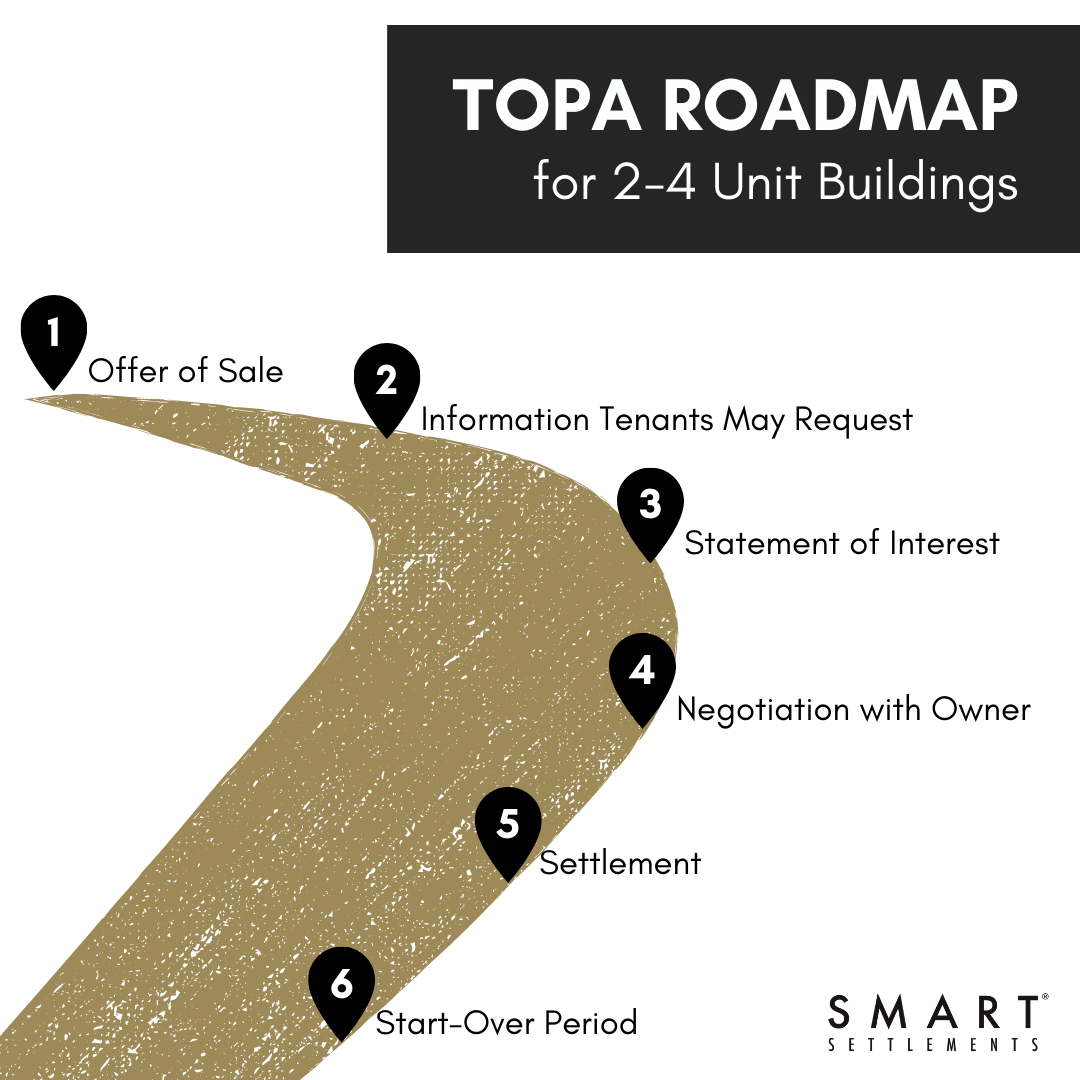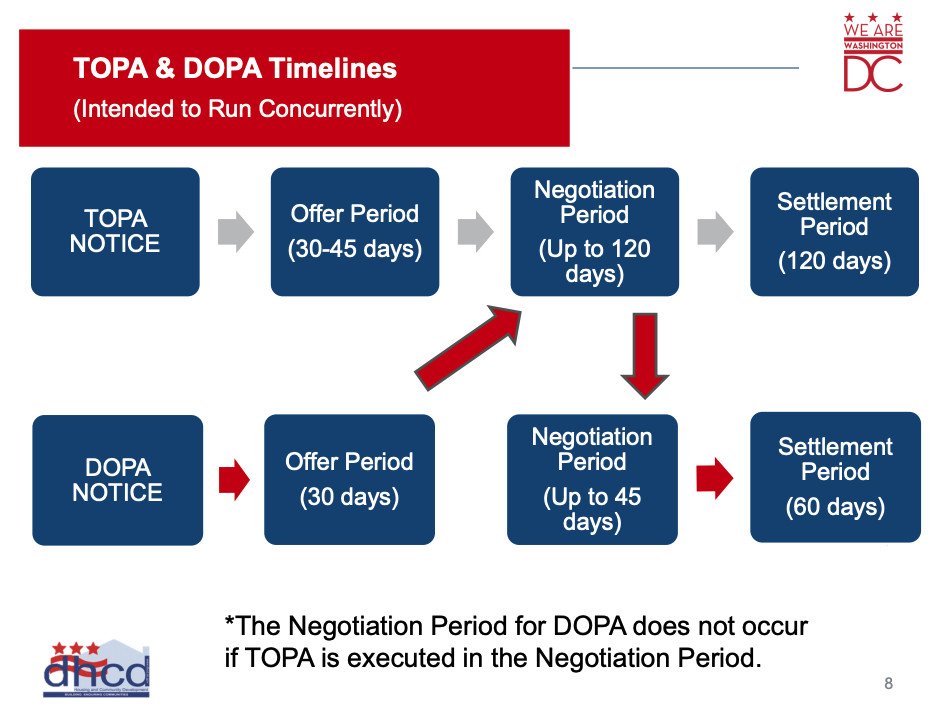D.C. TOPA Roadmap for 2-4 Unit Buildings

The District of Columbia Department of Housing offers a program that assists low- to moderate-income District residents who are threatened with displacement because of the sale of their building. DC Law 3-86, called the “Rental Housing Conversion and Sale Act of 1980,” falls under The Tenant Opportunity to Purchase Act (TOPA) and states that tenants in buildings up for sale must be offered the first opportunity to buy the building.
In July 2018, a new law exempted single-family dwellings from TOPA unless occupied by certain elderly or disabled tenants. A summary of qualified buildings is found here.
Related: Single-Family DC TOPA Roadmap
The following article provides resources for the TOPA process for two-, three- and four-unit buildings.
Recommended Steps for 2-4 Unit TOPA
Step 1: Sales Contract Addendum
Include the Tenancy Addendum to the contract reflecting each tenant’s name and specifying whether Purchaser will require a vacant property at closing. Attach all lease copies that are available.
Step 2: Offer of Sale Notice
Deliver Offer of Sale via trackable delivery to all tenants/adult occupants and send a copy to DC DHCD:
- Form A (Offer of Sale with contract) mailed to tenants, OR
- Form B (Offer of Sale without contract) and Form C (First Right of Refusal along with copy of contract once it’s ratified) mailed to tenants
AND
- Photo of Form A or Form B and C, as applicable, posted in conspicuous area of the common area of building
DO NOT HAND DELIVER FORMS. BE PREPARED TO PROVIDE DELIVERY RECEIPTS FOR ALL NOTICES PLUS COPIES OF ALL NOTICES SENT AND PHOTOS OF POSTED NOTICES. TITLE WILL NEED THESE.
Step 3: Tenants Sign Off
After you have delivery confirmation of STEP 2, your title company needs either:
- The attached notarized Assignment Form with minimum consideration of $500.00 signed by each tenant. If tenant is conveying with property, you can put N/A in #6.
OR
- Notarized GCCAR Form 1316 Waiver (found here) signed by all tenants.
NOTE: These are not statutorily required forms but rather title underwriter required forms.
Step 4: Title Obtains Confirmation From DC
SMART orders a Review of File Letter from DHCD which will confirm the delivery of all required forms and will indicate if any tenant has exercised rights.
FAQs
1. WHO IS A TENANT FOR PURPOSES OF TOPA?
- Consider all permissible adult occupants of the property to be tenants. Not having a lease agreement does not mean you are not a tenant under TOPA.
2. WHAT IF A TENANT HAS ALREADY MOVED OUT OF THE PROPERTY?
- All tenants in the property at the time Seller decided to sell must go through the above process. Even if they have moved, you must still go through the entire process with that tenant.
3. WHAT IF A TENANT SENDS A STATEMENT OF INTEREST?
- Refer to Question 5 below, and feel free to contact SMART directly as to how this may impact your transaction
4. WHAT IF TENANT WILL NOT SIGN ASSIGNMENT OR WAIVER FORM?
- The TOPA statute is intended to reduce tenant displacement and incentivize landlord payment to tenants. Sellers may want to consider negotiating a payment amount to the tenant for them to sign the tenant assignment form.
5. WHAT IF THE TENANT WILL NOT VACATE?
- The tenant’s occupation of the property is separate and apart from their TOPA rights. For example, a tenant can waive or assign TOPA rights but still occupy the property. Sellers may want to consider payment to tenants to incentivize vacating. This agreement can be memorialized and bundled into the same Tenant Assignment Agreement.
- If a tenant is wrongfully occupying the property, no “self-help” is permitted to remove the tenant. The landlord must seek eviction in the Landlord Tenant Court.
About TOPA
Laws in TOPA provide legal protections for tenants who are at risk of being displaced. TOPA provides that before the building owner sells, demolishes, or discontinues residential housing use of a rental property, the owner (often referred to as landlord) must first give current tenants an opportunity to purchase the unit and a right of first refusal to match a third-party contract. Additionally, tenants have the authority to assign their purchase opportunity to another party. Tenants even have the right to make a legal arrangement with the third-party buyer, including selling the rights for cash or creating an agreement for the tenant to remain in the building.
How TOPA Applies to 2-4 Unit Buildings
The following process applies to duplexes (two units), triplexes (three units), and quads (four units) only. You can download the instructions for this process from the District of Columbia Department of Housing and Community Development here.

1. Landlord Makes Offer of Sale
Before a landlord can sell a 2-4 unit rental accommodation, the landlord must notify all of the tenants and provide them with an Offer of Sale (Form A or Form B).
You can download the Offer of Sale with a third-party contract (Form A) while the Offer of Sale without a third-party contract form (Form B). If sending Form B, keep in mind that the landlord must still send the First Right of Refusal (Form C) once a third-party contract is ratified. The decision to send form A or B is a tactical one. Many landlords will send Form A with ratified contract attached to cut down on additionally having to send a First Right of Refusal form once a third-party contract is ratified.
If a third-party contract is already in place, the landlord is required to provide the tenants with a copy of the contract within seven days of the tenant’s request.
2. Tenants May Request Information
Upon receipt of an Offer of Sale, tenants are permitted to request certain information, which the Landlord is required to provide within seven days of the request. Information allowed by TOPA include:
- Building floor plan
- Itemized list of operating expenses
- Utility consumption rates
- Capital expenditures for the previous two years
- The most recent rent roll
- List of current tenants and vacant units
3. Tenants Submit A Statement of Interest
The tenants must deliver a written Statement of Interest to both the landlord and the Department of Housing and Community Development (DHCD) to collectively exercise their right of purchase. For properties with 2-4 units, an official tenant organization is not required for all of the tenants to submit one Statement of Interest.
Download GCAAR Form 1316: Tenant Opportunity to Purchase Affidavit on the GCAAR website.
This Statement of Interest must be sent via certified mail or delivered in person (location found on the DHCD website) within 15 days of DHCD receiving the Offer of Sale or within 15 days of the tenant receiving the Offer of Sale, whichever happens later.
If collectively the tenants do not submit a Statement of Interest within the 15 days, an individual tenant is allotted an additional seven days to exercise the right of purchase through a written Statement of Interest on their own behalf to both the landlord and DHCD. This statement must be sent via certified mail or delivered in person.
If the tenants do not intend to purchase the property and do not submit a Statement of Interest, each tenant should sign a TOPA waiver. If at this point all tenants or their assigned third parties refuse, then the landlord’s third party may then submit their Statement of Interest to the landlord and will follow a process similar to the one outlined below.
DOWNLOAD THE TOPA WAIVER AND AFFIDAVIT
4. Tenants Negotiate with Landlord
This law allows a minimum 90-day negotiation period that begins after the landlord receives the tenants’ Statement of Interest. The 90 days can be extended one day for every one day the landlord fails to deliver to the tenant the information required by TOPA.
Further, the 90 days can be extended by 15 days if the landlord enters into a third-party contract before or during the negotiation period. These additional 15 days is known as the right of first refusal period. With the right of first refusal, tenants have the right to match the material terms of any contract for sale between the landlord and a third party. During the right of first refusal period, tenants are allowed by law to match the third-party contract within those 15 days. If the landlord gives the tenants the contract before or during the 90-day negotiation period, then the 15 days are added to the end of the negotiation period (as opposed to 90 days plus 15 days).
If the collective of tenants fails to reach an agreement with the landlord, an individual tenant may extend the negotiation period by 30 days.
The law also requires that the landlord and tenant(s) negotiate in good faith. Examples of bad faith include:
- Landlord fails to offer the tenants a price or term that is at least as favorable as the one offered to a third party;
- Landlord fails to contract with tenants with terms that substantially conform with the price and terms of a third-party contract without reasonable justification for doing so; and
- Tenants or landlord intentionally fail to comply with the TOPA statute.
Tenants are not required to prove financial ability to the landlord as a condition for entering into a contract, and the Tenant does not have to pay the purchases price in installments unless the Landlord provides the Tenant financing on terms that are considered reasonably acceptable by the Tenants.
However, landlords are permitted to require the tenants to pay a deposit of up to 5% of the sales price listed in the contract in order to make a contract. The tenant’s deposit is refundable if the landlord acts in bad faith.
Tenants have the right to assign or sell their rights to other groups rather than purchasing the building outright. Additionally, tenants can use their rights to limit rent increases, negotiate better building conditions, and other tenant benefits.
If negotiations with these tenants fail, then any other current tenant has 30 days to enter into a sales contract. If a contract is accepted, the landlord must give the tenant 90 additional days for settlement, plus an additional 30 days if the tenant’s lender requires it.
Instructions for preparing and issuing a right of first refusal for two-, three-, and four-unit rental housing accommodations are found here.
5. Tenants and Landlord Reach Settlement
Tenants have 90 days from the date of contracting to secure financing and/or financing assistance. If the tenants’ lender states in writing that a financing decision will be made within 120 days from the date of contracting, then the landlord is required to honor that extension.
6. Start-Over Period
The TOPA process starts over with a new Offer of Sale in the event the landlord does not enter into a sales contract within 240 days of the initial Offer of Sale.

Other Facts about TOPA for 2-4 Unit Properties
- If tenants find out after the fact that the landlord did not comply with TOPA, the tenants are permitted under TOPA to bring civil action against the landlord owner.
- The legal definition of “tenant” does not include a name on the lease or proof of paying rent. Because of that, it is best to consult a real estate attorney if you are a landlord or tenant in a TOPA situation.
- A transfer of ownership due to foreclosure or a foreclosure sale is exempt from TOPA (D.C. Official Code § 42-3404.02(c)(2)(C)).
For additional information on this topic, contact Evelyn Miller, Partner, at 202-753-7400.



